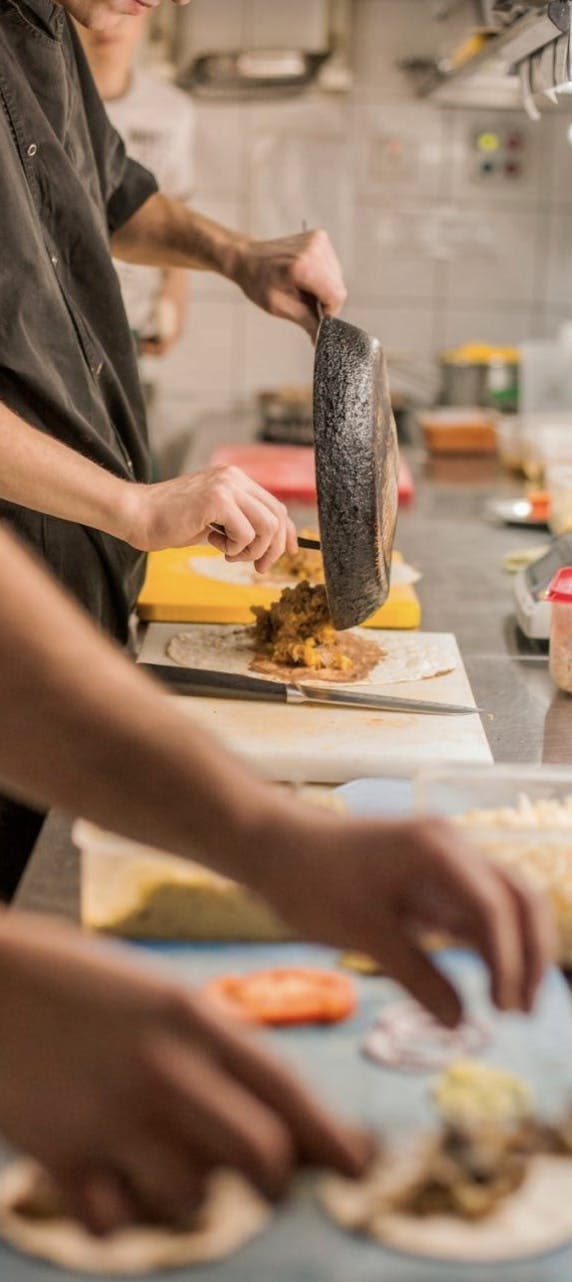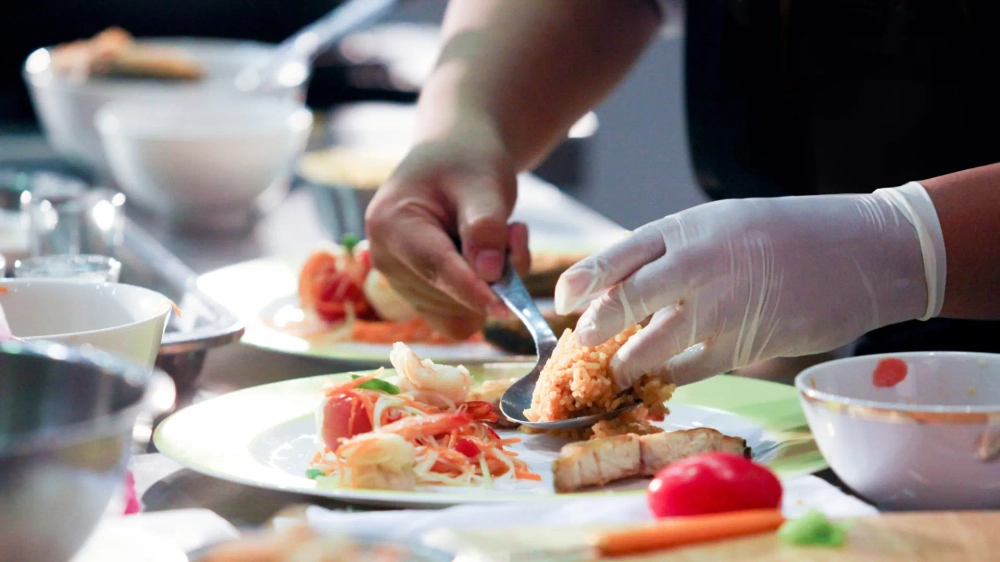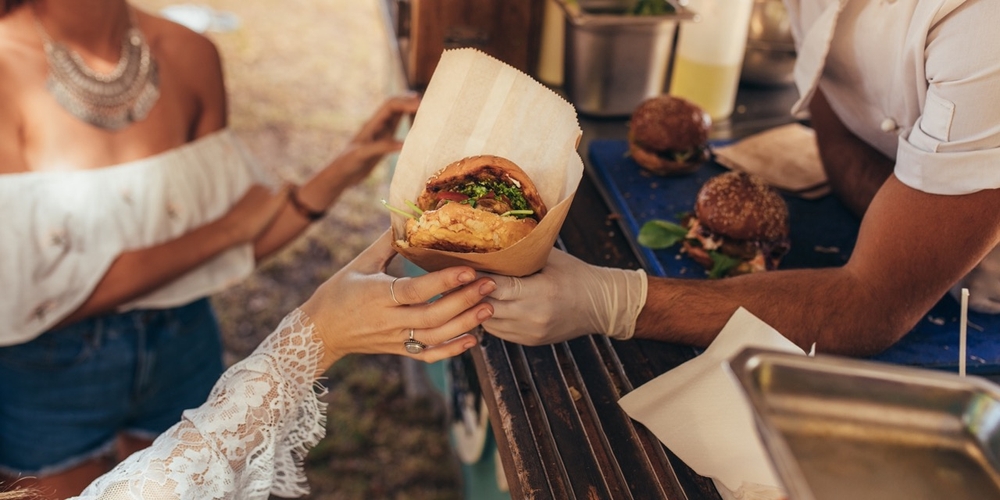Food licenses and permits you need in California
Table of Contents
CloudKitchens
How many tacos can be delivered from a 1000sqft restaurant?
The same amount as a 200sqft ghost kitchen.

From food trucks to 5-star restaurants, every eatery has one thing in common: licensing.
While not the most glamorous aspect of running a restaurant, obtaining the correct food licenses and permits is essential to ensure your business operates legally before you can serve up your first order.
So how exactly do you get a food license? California has several regulatory bodies you’ll need to work with. This guide aims to help you understand where to start and what you need to do to comply with state regulations.
Food handler card
Anyone who handles others’ food in California, including restaurant, cafe, and food truck workers, must obtain a California Food Handler Card within 30 days of being hired. This card, also known as a food handlers certificate or food handlers license, demonstrates that the individual has completed a food safety training course and passed an exam.
The training for a food handler card generally covers topics such as:
- Foodborne illness
- Proper food handling
- Personal hygiene
This license typically costs $10 or less per person, and must be renewed every three years.
Note that the Riverside, San Bernardino, and San Diego counties have distinct exams for food handlers. Restaurants in these areas must be sure to obtain the correct license at the county level, which is distinct from (and eliminates the need for) the general California Food Handler permit.
Food facility permit
All food businesses in California must obtain a permit from their local health department before opening. This permit ensures your facility—and the way you run it—meets necessary health and safety standards.
To obtain a food facility health permit, you’ll need to:
- Submit an application
- Pay a fee (which varies by county, ranging from a few hundred to a few thousand dollars)
- Undergo an inspection
During inspection, the county health department will review your facility’s layout, equipment, and food safety procedures to ensure compliance with regulations.
Seller’s permit
If you plan to sell taxable goods, such as packaged foods or merchandise, you’ll need to obtain a seller’s permit from the California Department of Tax and Fee Administration (CDTFA). This permit allows you to collect customers’ sales tax and remit it to the state.
You can apply for a seller’s permit in person at a CDTFA office or online through the CDTFA website, which will help guide you through the application process.
In addition to your personal information, the application process for a seller’s permit requires:
- Names and addresses of your suppliers, accountant, and personal references
- Anticipated monthly sales, and the taxable amount of those sales
- Personal information for partners, corporate officers, and limited liability company members
While there are no fees or costs for the seller’s permit itself, a security deposit is occasionally necessary.
Other permits and licenses
Depending on the nature of your food business, you may need additional permits and licenses. Consider just a few common examples of situations that require additional permits:
- Selling alcohol – Requires a liquor license from the California Department of Alcoholic Beverage Control (ABC). Different types of licenses are required depending on the type of alcoholic beverages sold and the nature of your establishment.
- Operating a food truck – Food trucks in California require a Mobile Food Facility Permit, which is issued after an inspection by the local county’s public health department.
- Offering “cottage” foods – Cottage Food Operation (CFO) permits allow you to sell certain products (baked goods, jams, dried herbs, etc.) directly to customers or through venues like a farmers’ market. Local public health departments also issue this permit.
In any scenario, thoroughly checking your county’s local food facility requirements is essential to ensure your venture is compliant, laying the foundation for success.
Best practices for maintaining permits
To ensure ongoing compliance, food business owners must stay vigilant in keeping all licenses and permits up to date.
Consider the following best practices for maintaining permits:
- Keep permits current – Regularly renew necessary permits before their expiration dates. Inform relevant organizations of changes in address or contact information.
- Stay informed – Stay up-to-date with regulation and permit requirements for ongoing adherence to the latest standards.
- Train employees – Provide regular training to employees on food safety, hygiene, and permit requirements to maintain a culture of compliance.
- Maintain good records – Save details for all permit-related documents and inspections. Consider using a calendar application to remind you of upcoming renewals.
Failure to obtain (or maintain) necessary permits can result in significant penalties—ranging from hefty fines and legal action to outright closure.
Streamline your restaurant licensing venture with a ghost kitchen
When it comes to getting a food license, California has several distinct requirements that often depend on your county. By researching and following local regulations, you maintain your restaurant’s reputation and pave the way for 100% licensed operational success.
But there’s another option you may not have considered: partnering with a ghost kitchen.
With CloudKitchens, licensing is baked into our streamlined process—meaning you can focus on people more than paperwork. You simply provide permits for your staff, and our ghost kitchens handle the rest, enabling your food business to hit the ground running without drowning in documentation.
From Sacramento to Sunnyvale and many more, book a tour of one of our locations and get started today.
Explore ghost kitchen locations across the US:
- Ghost kitchens in Seattle
- Ghost kitchens in San Francisco
- Ghost kitchens in LA
- Ghost kitchens in NYC
- Ghost Kitchens in Toronto
- Ghost Kitchens in Atlanta
- Ghost Kitchens in Dallas
- Ghost Kitchens in Chicago
- Ghost Kitchens in Denver
- Ghost Kitchens in Miami
| DISCLAIMER: This information is provided for general informational purposes only and the content does not constitute an endorsement. CloudKitchens does not warrant the accuracy or completeness of any information, text, images/graphics, links, or other content contained within the blog content. We recommend that you consult with financial, legal, and business professionals for advice specific to your situation. |
Sources:
eFood Handlers. How to get your California Food Handlers Card. https://www.cafoodhandlers.com/California-Food-Handlers-Card
County of LA Public Health. How to Obtain a Restaurant (Food Facility) Permit. http://publichealth.lacounty.gov/eh/inspection/how-to-obtain-restaurant-food-facility-permit.htm
California Dept. of Tax and Fee Administration. Obtaining a Seller’s Permit. https://www.cdtfa.ca.gov/taxes-and-fees/faqseller.htm
California Dept. of Alcoholic Beverage Control. Application Fee Schedules. https://www.abc.ca.gov/licensing/license-fees/application-fee-schedules/
County of LA Public Health. About Food Trucks. http://publichealth.lacounty.gov/eh/business/food-trucks-carts.htm
California Dept. of Public Health. Cottage Food Operations. https://www.cdph.ca.gov/Programs/CEH/DFDCS/Pages/FDBPrograms/FoodSafetyProgram/CottageFoodOperations.aspx
More insights & stories
There’s more where that came from.
Get in the know and check out our additional insights


